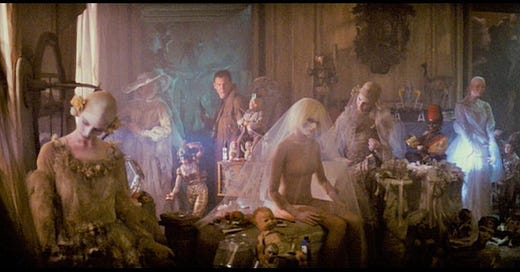I customize my ringtone but it’s always you, it’s always you, it’s always you, it’s always you, it’s always you
- ringtone, 100 gecs
The trans girl vocoder music revolution is upon us. The sweaty summer tunes pouring out of our windows and into the slowly, terrifyingly refilling streets of a supposedly post-covid world are more electrical current than flesh. Tami T, 100 gecs, and SOPHIE should be vibrating through our bodies in densely packed underground clubs as we size up potential mates among those who, like us and like them, have moved beyond the flesh and the real. Though anti-trans bigots are quick to hold up unseeable chromosomes as the sine qua non of ‘true sex,’ a supposedly irrefutable gotcha, these vocoder gerhls walk right on past them as they cross not only the lines between sexes but between nature and machine.

At this point, cyborgian transsexualism is almost passé. Yes, we’ve all read Donna Haraway, and we all over-identify with Pris in Blade Runner - why do you think so many trans girls are living out their messy goth teen years as adults? We are Frankenstein’s monster above the village of Chamounix, we are collectively performing the Silicone Diaries (Nina, where have you gone?) - we are, after all, the dolls as the children say.
We reshape our flesh at will - at least, within the limits of our position within racial capitalism and our ability to navigate Byzantine healthcare systems set up to murder us - and in this way we are the most obvious manifestation of modernity, or so the argument goes. As Preciado has more than amply demonstrated in Testo Junkie, cis people chemically and surgically alter their genders just as much as trans people do, but of course their participation in the pharmacopornographic regime doesn’t attract the same fascination and revulsion.
Though cross-sex change procreation is as yet out of reach - something I personally have less than no interest in anyway - it’s really the voice that ‘gives it all away.’ For trans women (etc.), hormones have no effect on the voice, and many of us endure months or even years of vocal training in order to create a voice whose speech won’t cause more violence to rain down on us. A trial that not all pass, and some flat out refuse. When I transitioned nearly 20 years ago, there was no other options. Well, that’s not entirely true. There were vocal surgeries, with an equal split 50/50 chance between rendering you mute or making you sound like a CareBear. But scientists are wizards and now the girls who can afford it shuffle off to South Korea to have extremely delicate lazers shot down their throats. Six months later, the dolls sound good!
We are no longer so limited by the constraints of the flesh.
(An aside: It’s silly and ahistorical to talk about trans healthcare as a feature of modernity, even if it is fun to imagine us as cyberpunks. In fact, trans people have been getting surgeries for thousands of years. My favourite are the Galli of Ancient Rome, priestesses of the Magna Mater, Cybele, whose initiatory rites involved self-castration with a device that can only really be described as looking like a nutcracker (I’m so sorry but it’s true) on the steps of the courthouse. The Day of Blood was an annual tradition to bring new members into the cult, who would then take on feminine names, dress in women’s clothing, and wear makeup. Due to their political ties to the Phrygians, the Romans had to tolerate their loud and garish existence, but decided it would be best to make it illegal for any Roman to join their ranks.)
Is there anything more emotionally and, if we’re being honest, erotically compelling than surgical scars? Evidence of a body fought for, of a life decided. Though not all trans people share them in common, I have always felt a powerful charge of identification with my trans friends’ and lovers’ scars. To show them can be an act of vulnerability, to bear them is to say that this was important enough to me that I had to take grievous action on my own body to manifest it.
Some years ago, I was in love - I never loved this hard, this fast before - with a man whose body was marked by scars. Not just top surgery, no. I often slid my fingers down the thin lines of fibrous tissue that cut down each side of his spine, holding two long steel rods in place beneath the skin. When I looked into his grey eyes, I looked at two glass lenses stitched inside the flesh of them. His was a body remade by teams of paediatric surgeons before he had even had a chance to remake it himself. This body, which would ultimately fail him, was full of desire - not just for me, but for living. The desire ran through him and out into the world, everyone in a socially distanced 2 metres could feel it radiating off of him. They didn’t have to see the scars for everybody to be in love with him, but those of us who did found him even more difficult to resist.
But eventually the current of desire ran all the way out into the world and left both me and that body, made and remade and remade again, behind. Sometimes to be flesh itself is too suffocating a constraint.

No longer hindered by the flesh, as SOPHIE tells us through one of her many proxies, “I could be anything I want / Immaterial boys, Immaterial girls / anyhow, anywhere, anyplace that I want.” It’s a shockingly spiritual idea if you subscribe to the sort of post-Enlightenment binary that positions spiritual and physical, natural and mechanical, immaterial and material as opposing forces.
To be trans is to - forgive me - transcend the primacy of the flesh. “There’s a world inside you, I want to know what it feels like,” SOPHIE whispers in what is perhaps her ‘real’ voice.
The trans girl vocoder revolution refuses to wait for a better world. It grabs the detritus of late capitalism, refusing the shaming gaze of second-wave feminism’s fraught obsession with naturalism, and makes a run for the fully automated transsexual luxury communism every anime avi Twitter catgirl claims to long for. The trans girl vocoder revolution is post-body.
Long live the New Flesh.
xx
M


